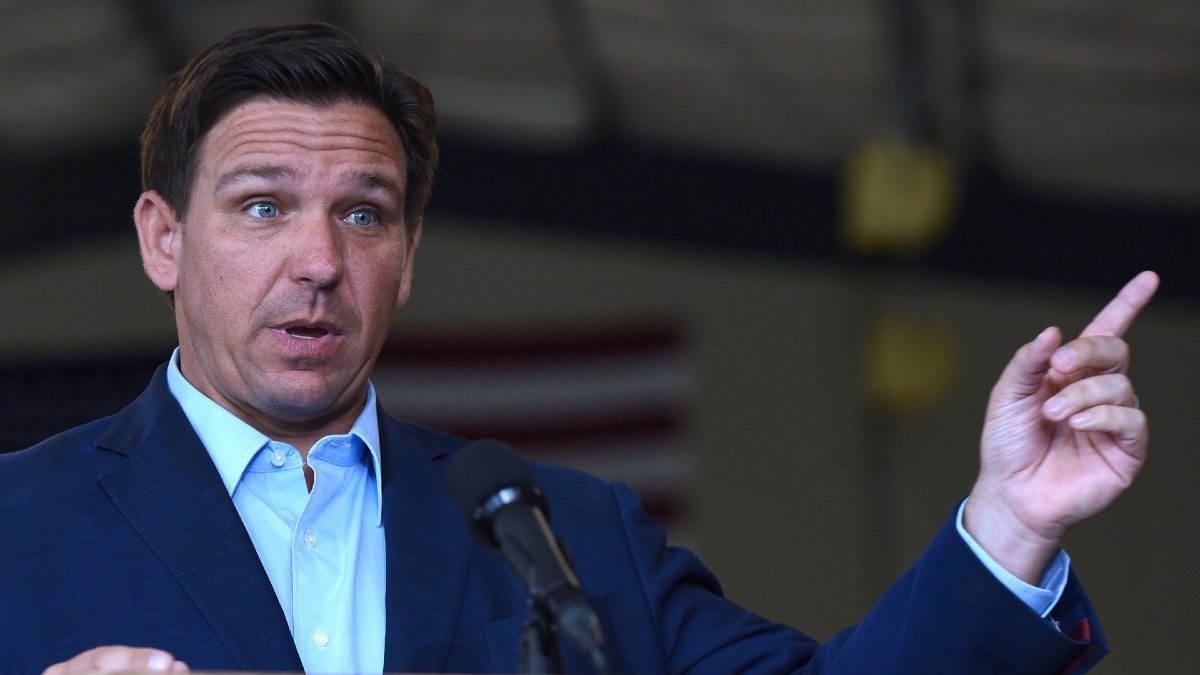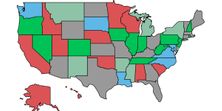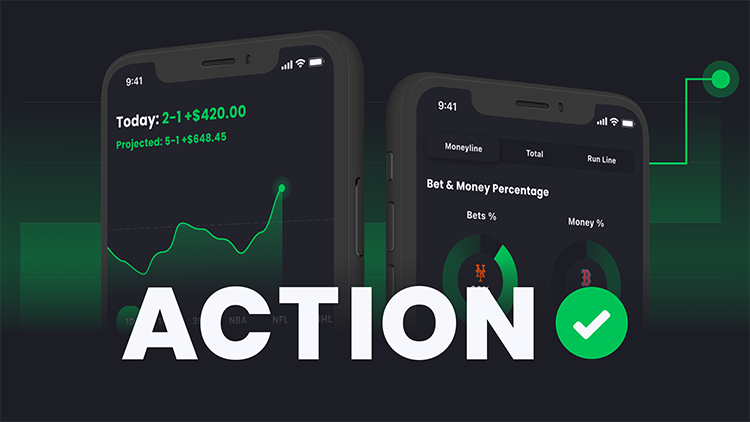Florida’s Convoluted Sports Betting Path: Obstacles and Opportunities
Paul Hennessy/SOPA Images/LightRocket via Getty Images. Pictured: Florida Governor Ron DeSantis.
Gaming industry observers are increasingly optimistic Florida, one of the nation’s most complex gambling stakeholder markets and biggest sports betting prizes, is closer than ever to legal wagering.
The Miami Herald reported Republican Gov. Ron DeSantis is near a breakthrough gaming compact agreement with the Seminole Tribe that could end a multi-year stalemate, generate hundreds of millions of dollars in annual tax revenues and expand the state’s legal gaming options. An announcement could come as early as this week.
This follows a Politico report that Las Vegas Sands, the company of deceased former GOP megadonor Sheldon Adelson, is lobbying for expanded Florida casino gambling. Additionally, the Washington Post reports that former President Donald Trump’s family is pushing for casino gaming at the family’s Doral resort in Miami.
That’s on top of two separate Republican-sponsored 2021 legislative packages that would legalize, regulate and tax Florida sports betting.
That doesn’t mean legalizing Florida sports betting (or any new gaming form) will be easy — or even inevitable — as multiple Sunshine State gaming attorneys said during a law school gaming symposium Tuesday. A 2018 constitutional amendment, on the surface, appears to be the biggest impediment, but that may pale in comparison to the political motives of would-be beneficiaries.
“(DeSantis) has to do his best bringing the stakeholders together,” said Hallandale Beach-based sports betting attorney Daniel Wallach during a Florida International University College of Law webinar, “because the No. 1 issue in Florida is not the state constitution, but the disparate interest of competing stakeholders.”
Here are just some of the major political and logical factors in addition to those stakeholders impacting what could be the most populated state with legal sports wagering.
The Gaming Compact
Obstacles: The state’s deal with the Seminoles is far and away the most important factor for any possible gaming expansion. The tribe is the state’s most financially and politically powerful gaming stakeholder; no sports betting deal is plausible without its support. For nearly a decade, multiple gubernatorial administrations have been unable to update a governing compact that grants the tribe certain exclusive gaming rights in exchange for a portion of gaming revenues. Meanwhile, the Seminoles suspended as much as $300 million in annual payments several years ago.
Opportunities: DeSantis has released little publicly about these notoriously complex and private compact negotiations, though last week’s reports are the best sign yet a deal could be close. If so, the single most substantial roadblock is gone from legal sports betting legalization.
Disney
Obstacle: The state’s iconic tourist destination and multimedia content conglomerate also has enormous political power in Florida. The company has vehemently opposed all new gambling initiatives for decades.
Opportunities: Disney could be warming to legal gaming after it took a financial stake in FanDuel via its recent acquisition of certain former FOX media properties. Disney’s ESPN also has a high-profile sports betting deal with Caesars and William Hill and recently announced plans for a plethora of new gambling content across multiple platforms.
The Florida Constitution
Obstacle: The Seminoles and Disney contributed millions to the successful 2018 constitutional amendment campaign that stripped the legislature’s ability to consider gaming expansion measures without voter approval through a ballot referendum.
Opportunities: Legal analysts such as Wallach believe sports betting is exempt from this restriction since it didn’t fall under a narrow interpretation of the amendment’s casino gaming provisions. Additionally, several lawmakers have already introduced sports betting bills this year, further underscoring this belief.
Lawsuits
Obstacle: This could still spark legal challenges — especially should a gaming stakeholder not gain sports betting authorization and seek to challenge the enabling legislation or compact in court.
Opportunities: Assuming legal analysts are correct, these lawsuits could only delay legal wagering implementation, not derail it. And if the myriad leading stakeholders and politicians reach a comprehensive deal, there may be far less political and financial incentive to challenge such a proposal, even if it technically violated the letter of the law.
Other Stakeholders
Obstacles: Though the Seminoles dominate Florida’s gaming landscape, they are far from alone.
- There are dozens of smaller brick-and-mortar gaming establishments such as horse tracks, poker rooms and jai alai facilities.
- The multibillion-dollar Florida lottery and its thousands of retailers.
- Nine Florida professional sports teams in the “Big Four” of the NFL, NBA, NHL, MLB, plus franchise in smaller leagues such as the MLS and Florida-based USL soccer league.
- Out-of-state sportsbook operators such as DraftKings, FanDuel and BetMGM would also have a vested interest and role in any sports betting expansion.
- Other variables such as the rumored Trump South Florida casino which, no matter how logistically unlikely, could alter or upend gaming negotiations.
All these entities (and likely others) would push for legal betting rights, setting up another battle with the tribe over gaming rights — and gaming dollars.
Opportunities: Compromise, however difficult, is possible. Connecticut, a state whose own gaming dynamic have parallels to Florida, recently reached a sports betting deal with its powerful gaming tribes that also expanded retail wagering options to its state lottery and off-track betting parlors. Critically, sports betting is a far smaller revenue generator than slots or even table games, and a deal between DeSantis and the Seminoles could open the door for other, more lucrative gaming options aside from sports betting for the tribe and possibly even other smaller stakeholders.
The Florida Legislature
Obstacles: Assuming lawmakers can advance any gaming or gaming-related bills, there is little consensus over how would-be operators could enter the market or even which entities could do so. Florida is one of the nation’s most disparate states culturally; elected officials in more rural North Florida have vastly different constituent needs than those in densely populated South Florida. These disparate policymakers also represent markedly different gaming interests (or those who would rather have no gaming at all), creating a political hodgepodge that makes any bill difficult — especially something as complex and controversial as legal gambling — which they would also have to pass before the 2021 session ends next month.
Opportunities: If Republicans such as DeSantis and Senate President Wilton Simpson, who is reportedly leading compact negotiations, announce a comprehensive gaming deal, it will be difficult politically for the GOP-controlled legislature to oppose such an agreement’s ensuing legislative actions, particularly if it means several hundred million dollars in new revenues.
What Does This All Mean?
To the disappointment of all would-be beneficiaries, it’s still too early to tell if the opportunity or obstacles will win out.
A new compact would be the most significant boost for legal Florida sports betting since the Supreme Court struck down the federal wagering ban nearly three years ago. However, any or all of the aforementioned factors could shape, slow or even kill any gaming effort.
“I think we have a lot of interest in Florida that slow the process down,” Tamara Malvin, partner at Akerman LLP in Ft. Lauderdale, said during Tuesday’s symposium. “I’m not saying slowing it down is a bad thing. There’s no judgement in that statement, but when you don’t have existing interests, things can move a little bit more rapidly.”
Speaking at Tuesday’s symposium, PointsBet Chief Innovation Officer Seth Young told several dozen industry journalists, stakeholders and law students there was no timeline for Florida sports betting when or if it passes into law.
“Your guess,” Young said, “is as good as mine.”
How would you rate this article?



